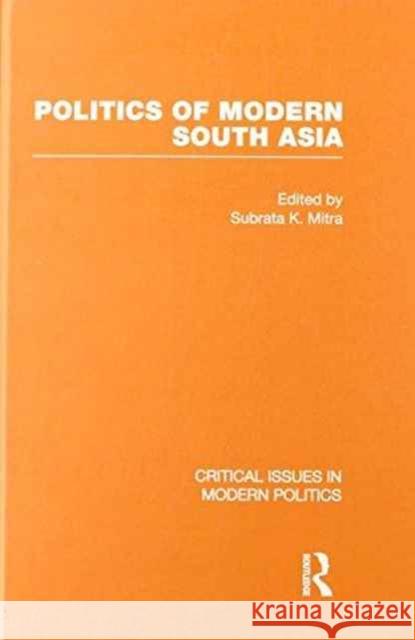Politics of Modern South Asia » książka
Politics of Modern South Asia
ISBN-13: 9780415440448 / Angielski / Twarda / 2009 / 2280 str.
Comprising the states of Bangladesh, Bhutan, India, Nepal, Pakistan, Sri Lanka, and the Maldives, South Asia has gained considerable international visibility over the past decade. Nuclear proliferation, the rapid evolution of India as a major global economic player, the emergence of new markets, cross-border terrorism, and issues of climate change and the environment are prominent among the factors that have contributed to the growing importance of the region. This has led to a commensurate growth of interest in the modern politics of South Asia, and a vast expansion of in scholarly work. This new five-volume collection from Routledge brings together the best and most influential research to make sense of this ever-expanding corpus. And while each of the five volumes has been carefully designed by the collection s editor to be self-contained, they are also helpfully linked to one another through a general introduction (which places the assembled materials in their intellectual and historical context), cross-referencing, a general index, and an annotated bibliography of further readings. Each of the five volumes is organized around the following themes: History, Political Theory and Institutions; Society, Religion, Political Culture, and Movements; Political Economy (in two parts: volumes 3 and 4); and International Relations to provide a readily accessible and comprehensive research and pedagogic resource which will be especially welcomed by scholars, students, policy-makers, and anyone else with a serious interest in the politics of this fascinating region."
Comprising the states of Bangladesh, Bhutan, India, Nepal, Pakistan, Sri Lanka and the Maldives, South Asia has gained considerable international visibility over the past decade. Nuclear proliferation, the emergence of India as a major economic player, the emergence of new markets, cross-border terrorism, and issues of climate change and the environment are prominent among the factors that have contributed to the growing importance of the region. This has led to a rapid growth of interest in the modern politics of South Asia and a vast expansion of the scholarly literature, particularly in academic journals. These articles represent the depth and variety of the academic literature in a synoptic and compact way.
This four volume set provides a cross-referenced and easily accessible collection of the best scholarly articles in the field of South Asian politics. The articles are selected in terms of their scholarly ranking and significance for the field as a whole. While each of the four volumes is designed to be self-contained and cohesive, the volumes are linked to one another through the general introduction, cross-referencing, a general index and a bibliography of further, annotated readings.
Each volume brings together scholarly articles on the following themes: History, Political Theory and Institutions; Society, Religion, Political Culture and Movements; Political Economy; International Relations. As such, taken together, these volumes provide, for the first time, a comprehensive academic tool for students at the level of the advanced undergraduate or above, policy makers, journalists, and, national and international organizations, engaged in the area of South Asian politics.











